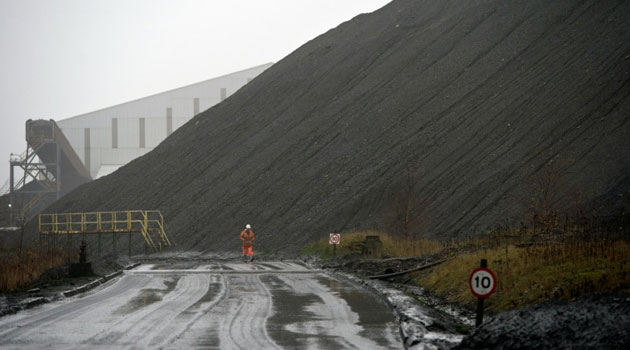
A mine worker walks past a slag heap at the entrance to Kellingley Colliery, the last deep coal mine operating in Britain near Knottingley, northern England on December 15, 2015
© AFP
KNOTTINGLEY (United Kingdom) (AFP) – The closure of Britain’s last coal mine on Friday in a misty corner of Yorkshire brings to an end a proud history of industrial boom and social struggle.
“Britain’s best miners work at Kellingley,” reads a sign outside the colliery in northern England in a community that is dreading the inevitable final shift.
“I feel gutted, like everybody else,” said Tony Carter, 52, one of 450 miners who day in day out dig out coal 800 metres (2,600 feet) underground.
“It’s the end of an era. This week we’re history — the last deep mine in England. Our country was built on coal — the industrial revolution,” he said.
As in many parts of Europe, the miners, the slag heaps and the trucks filled with coal will become a distant memory at the mine known as “Big K”.
The historical milestone will remove a vital source of income in the area, centred around the village of Knottingley, and leave many families here questioning their economic future.
“My father was a miner. Most of the people, their dads have been miners, so it’s in your heritage.”
Crying into his pint of beer at the local miners’ social club, Kevin Butler said: “It’s a miner’s town. The miners want to work… They don’t want handouts. The lads want to work. It’s killed this town”.
– ‘A profitable mine’ –
When Butler’s son heard that Kellingley was closing he moved to Australia to find a job but not everyone is fortunate enough to be able to make the move.
Many of the employees at Kellingley — of whom many started mining aged 15 — see few other jobs.
Keith Poulson, local secretary of the National Union of Miners (NUM), is particularly bitter.
“It’s absolutely maddening to think that we’re just going to turn our backs on a profitable mine, an industry where you’ve got a skilled workforce,” he said.
Poulson, a former miner, said Kellingley was surrounded by three coal-fired power stations including one — Drax — which produces between seven and eight percent of Britain’s electricity needs.
“We’ve got 20 years’ plus reserves of coal available to obviously be delivered to Drax but for some reason British coal is no longer needed,” he said.
Drax will instead receive cheaper coal which Britain imports from countries like Colombia and Russia.
In the new age of climate change commitments and renewable energy, emissions-producing coal is out of fashion.
The government last month said it planned to shut down the most polluting coal power stations by 2025.
Out of the three currently around Kellingley, only Drax will still be functioning beyond 2016.
Poulson said miners had fallen victim to profit margins and taxes, while the cost of coal has increased only slightly in recent decades.
Despite feeling abandoned, the miners reminisce of better times and the camaraderie that bonded them.
“I enjoyed every minute of it,” Carter said.
“Fantastic group of people. You never might meet better people than miners.”














































